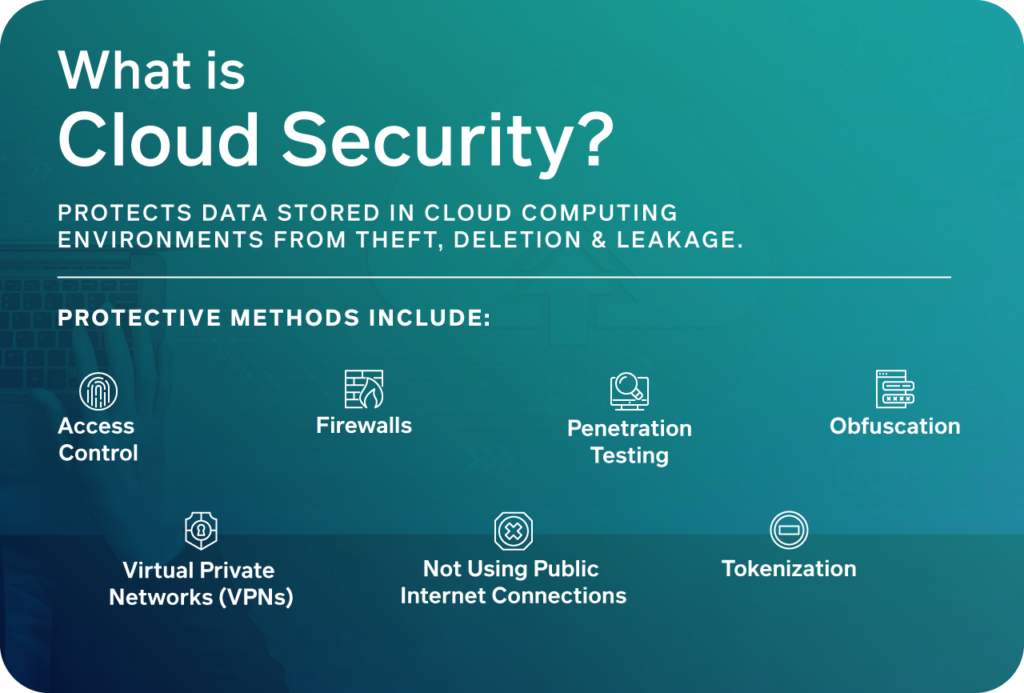Cloud computing cyber security fundamentals involve securing data in cloud networks to ensure privacy and protection. Businesses use cloud services for storage, servers, and software over the internet to reduce costs and enhance scalability.
Cloud security focuses on safeguarding data across networks and managing access privileges. By implementing robust security measures, organizations can mitigate risks and maintain data integrity in cloud environments, thus ensuring the confidentiality, availability, and integrity of their information. Understanding the core principles of cloud security is crucial for businesses looking to leverage the benefits of cloud computing while safeguarding their digital assets against cyber threats.
Cloud Computing And Cyber Security Intersection
Cloud computing cyber security fundamentals are essential for protecting data in the cloud. This intersection focuses on securing cloud services and infrastructure to prevent unauthorized access and data breaches. Understanding these fundamentals is crucial for businesses to ensure the privacy and integrity of their data in the cloud.
Cloud computing and cyber security are two important aspects of modern-day technology that intersect with each other. With the increasing use of cloud computing, it is important to understand the fundamentals of cyber security in the cloud context. In this blog post, we will define cloud computing and cyber security and explore how they intersect with each other. We will also discuss the fundamentals of cloud security and the responsibilities of the customer in ensuring a secure cloud environment.
Defining Cloud Computing
Cloud computing refers to the delivery of hosted services, including storage, servers, and software, through the internet. It enables businesses to access computing resources on-demand and allows them to scale their operations as per their requirements. Cloud computing offers several benefits, such as reduced costs, increased efficiency, and flexibility. However, it also poses several security challenges that need to be addressed.
Cyber Security In The Cloud Context
Cyber security in the cloud context refers to the measures taken to secure cloud-based data and applications from unauthorized access, theft, or damage. Cloud security goals include ensuring the privacy of data across networks, protecting cloud accounts from unauthorized access, encrypting and safeguarding cloud-based data assets, and managing the security posture of the cloud environment.
Fundamentals Of Cloud Security
The fundamentals of cloud security include the security responsibilities that are always the customer’s. These responsibilities include managing users and their access privileges, safeguarding cloud accounts from unauthorized access, encrypting and protecting cloud-based data assets, and managing the security posture of the cloud environment. Companies that provide cloud services also have their own set of security responsibilities, which include securing the physical infrastructure, providing network security, and ensuring compliance with industry regulations.
To summarize, cloud computing and cyber security intersect with each other, and it is important to understand the fundamentals of cyber security in the cloud context. Cloud security goals include ensuring the privacy of data across networks, protecting cloud accounts from unauthorized access, encrypting and safeguarding cloud-based data assets, and managing the security posture of the cloud environment. The fundamentals of cloud security include the security responsibilities of both the customer and the cloud service provider.
Cloud Computing Models
Cloud computing offers various service and deployment models, each catering to different business needs and requirements. Understanding these models is crucial for businesses looking to harness the power of cloud computing. In this section, we will delve into the Service Models and Deployment Models of cloud computing.
Service Models: Saas, Paas, Iaas
Cloud computing encompasses three main service models: Software as a Service (SaaS), Platform as a Service (PaaS), and Infrastructure as a Service (IaaS). Each model provides distinct functionalities and benefits for businesses.
- SaaS (Software as a Service): This model allows users to access and use software applications over the internet without the need for installation or maintenance. It is ideal for businesses looking to streamline their operations and reduce infrastructure costs.
- PaaS (Platform as a Service): PaaS offers a platform allowing customers to develop, run, and manage applications without the complexity of building and maintaining the infrastructure. It provides a framework for developers to create customized applications.
- IaaS (Infrastructure as a Service): IaaS provides virtualized computing resources over the internet. It includes virtualized hardware, storage, and networking, allowing businesses to scale their infrastructure based on demand without investing in physical hardware.
Deployment Models: Public, Private, Hybrid
Cloud computing deployment models refer to how and where the cloud services are hosted and accessed. The three primary deployment models are Public Cloud, Private Cloud, and Hybrid Cloud, each with its unique characteristics and use cases.
- Public Cloud: This model offers services to multiple organizations over the internet. It is managed by third-party providers and provides a cost-effective solution for businesses seeking scalability and flexibility.
- Private Cloud: Private cloud services are dedicated to a single organization, providing greater control and security over the infrastructure. It is suitable for businesses with stringent security and compliance requirements.
- Hybrid Cloud: Hybrid cloud combines the benefits of both public and private clouds, allowing data and applications to be shared between them. It offers flexibility, scalability, and the ability to meet specific business needs.
Core Principles Of Cloud Security
When it comes to cloud computing, cyber security fundamentals play a crucial role in ensuring the protection of data and resources. The core principles of cloud security encompass various aspects such as confidentiality, integrity, availability, identity and access management, and more.
The Cia Triad: Confidentiality, Integrity, Availability
The CIA triad stands for the three core principles of information security, which are confidentiality, integrity, and availability. These principles form the foundation of cloud security and are essential for safeguarding sensitive data and maintaining system functionality.
Identity And Access Management
Identity and Access Management (IAM) is a critical component of cloud security that focuses on managing users and their access privileges. It involves safeguarding cloud accounts from unauthorized access, implementing encryption for data protection, and ensuring compliance with security standards.

Credit: stefanini.com
Threats And Challenges In Cloud Security
When it comes to cloud computing, cyber security is a critical aspect that cannot be overlooked. The shift to cloud-based solutions has brought about a new set of threats and challenges that organizations must address to safeguard their data and systems. Understanding the threats and challenges in cloud security is essential for implementing effective security measures.
Common Cloud Security Threats
1. Data Breaches: Unauthorized access to sensitive data stored in the cloud can lead to severe consequences for businesses and their customers.
2. Account Hijacking: Cybercriminals may gain access to user accounts and exploit them for malicious purposes.
3. Insecure APIs: Weaknesses in application programming interfaces (APIs) can be exploited to compromise the security of cloud services.
Unique Vulnerabilities Of Cloud Systems
1. Shared Resources: The multi-tenant nature of cloud environments increases the risk of data leakage and unauthorized access.
2. Insider Threats: Malicious activities by authorized users pose a significant risk to cloud security.
3. Compliance Challenges: Meeting regulatory requirements and industry standards in a cloud environment can be complex and challenging.
Best Practices For Cloud Security
When it comes to safeguarding your data in the cloud, implementing best practices for cloud security is vital. By following these fundamental principles, you can ensure that your cloud environment remains secure from potential cyber threats.
Implementing Strong Access Controls
One of the fundamental aspects of cloud security is implementing robust access controls. This involves managing user privileges and ensuring that only authorized individuals have access to sensitive data and resources within the cloud environment. IaC Security practices further enhance this by automating secure configurations, reducing the risk of human error, and aligning access controls directly within the code governing cloud infrastructure. By employing multi-factor authentication and role-based access control (RBAC), organizations can significantly mitigate the risk of unauthorized access. Another key aspect of cloud computing security is ensuring that data transfers to and from the cloud are protected.Tools like GoAnywhere MFT Cloud Connectors enable organizations to securely integrate cloud storage with automated file transfer workflows. This ensures data security while enhancing operational efficiency.
Data Encryption Techniques
Data encryption plays a crucial role in securing information stored in the cloud. Utilizing strong encryption algorithms helps protect data both at rest and in transit. By encrypting data before it is uploaded to the cloud and implementing secure key management practices, organizations can add an extra layer of protection to their sensitive information.
Emerging Trends In Cloud Cyber Security
Advancements In Cloud Security Technologies
Cloud security technologies are constantly evolving to keep up with the dynamic nature of cyber threats. Advanced encryption methods, multi-factor authentication, and secure access controls are some of the key advancements in cloud security technologies. Additionally, the integration of artificial intelligence and machine learning algorithms is enhancing the ability to detect and respond to security incidents in real-time.
The Future Of Cloud Computing Security
The future of cloud computing security holds promises of even greater resilience and adaptability. With the rise of quantum computing, there is a growing emphasis on developing quantum-resistant encryption techniques to safeguard data in the cloud. Furthermore, the convergence of cloud security with edge computing and IoT devices is expected to bring about innovative security paradigms that can effectively protect interconnected systems and devices.
Frequently Asked Questions
What Is Cloud Computing In Cyber Security Fundamentals?
Cloud computing refers to the delivery of hosted services, such as storage, servers, and software, through the internet. It allows businesses to reduce costs, accelerate deployments, and develop at scale. In terms of cyber security fundamentals, cloud security goals include ensuring the privacy of data across networks.
Cloud security responsibilities, such as managing access privileges and protecting data assets, are typically the customer’s responsibility. The CIA triad, confidentiality, integrity, and availability, is a fundamental security principle in cloud computing.
What Is Cloud Computing Quizlet Cyber Security Fundamentals?
Cloud computing in cyber security fundamentals enables convenient access to computing resources via the internet for businesses.
What Are The Fundamentals Of Cloud Security?
Cloud security fundamentals include data privacy, access management, encryption, and security posture management for cloud-based assets.
What Is Cloud Computing In Computer Fundamentals?
Cloud computing in computer fundamentals is the delivery of services like storage and software over the internet. It allows cost reduction and scalable development for businesses by accessing data stored on remote servers via the internet.
What Are The Key Benefits Of Cloud Computing In Cyber Security?
Cloud computing in cyber security provides cost reduction, faster deployments, and scalability for businesses.
Conclusion
To sum up, understanding cloud computing cyber security fundamentals is crucial for businesses today. It enables secure, cost-effective, and scalable solutions for data protection. By implementing robust cloud security measures, organizations can safeguard their valuable information and ensure smooth operations in the digital landscape.












































Leave a Reply